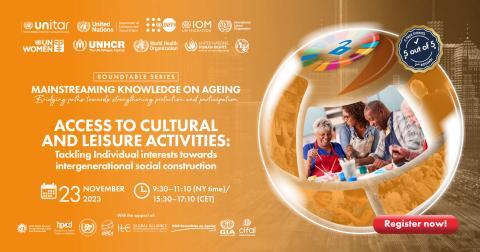
VIRTUAL ROUNDTABLE SERIES. "MAINSTREAMING KNOWLEDGE ON AGEING". 5th. Event out of 5 (1 hour, 50'): "Access to culture and leisure activities: Tackling individual interests towards intergenerational social construction"
General Scenario for the whole series
After having successfully taken stock of the current scenario of ageing and the human rights of older persons through the first round of this Series, we will keep fostering knowledge, empowerment, and partnerships by focusing this year on accessibility and its impact at the individual and collective levels. In this regard, accessibility should not only be associated to persons with disabilities but with a wide spectrum of barriers that can affect different generations while ageing. Human dignity as the cornerstone for better societies is grounded on fair parameters for all; including, access to justice, labour markets, political participation, health and social care services, as well as cultural and leisure activities.
In our series, we view national, regional, and international standards, as well as public policies, programs, and other initiatives as key learning elements. In the same vein, we consider that heightening awareness of ICT/digital accessibility implementation from design is relevant to better understand how older persons can benefit from digital products and services as means to actively participate in political, cultural, and socio-economic activities. By involving diverse stakeholders as co-sponsors, experts, speakers, and attendees, we aim to enhance discussions and build stronger synergies towards achieving our common goal.
The human rights of older persons and frontier issues, such as the demographic worldwide scenario, gender, human mobility, digital divide, and climate change, will continue as the heart of our discussions. In this endeavor, UNITAR and its International Training Centers for Authorities and Leaders -CIFAL Global Network-, UNDESA, UNFPA, IOM, UNWOMEN, UNHCR, WHO, OHCHR, ITU and ILO; together with the Group of Friends of the Human Rights of Older Persons UN Geneva; the Global Initiative on Ageing Foundation, GIA; the International Network for the Prevention of Elder Abuses; the International Longevity Centre; and the NGO Committee on Ageing Geneva; and the Harvard Law School Project on Disability, have joined efforts to put together these initiatives as a contribution to inclusive learning in the framework of the UN Decade of Healthy Ageing.
Background of the fifth event
Cultural rights are means to express the diversity of humanity through inter alia, values, beliefs, convictions, languages, knowledge and the arts, institutions, and ways of life; likewise, these rights also protect access to heritage and resources that allow such identification and development processes to take place.1
In the same vein, leisure activities can contribute to economic development, international understanding, peace, prosperity, and universal respect for, and observance of, human rights and fundamental freedoms.2
In this framework, access to cultural and leisure activities for older persons pursues social cohesion, which includes intergenerational dialogue, while fostering harmony and the promotion of mental and physical health, dignity, as well as prosper societies for all.
Therefore, targeted norms, mechanisms, public policies, as well as other initiatives in this regard should in a systematic manner encompass a structural transformation of those institutions and attitudes that reflect and entrench ageism.
Learning about the benefits and challenges coming from access to cultural and leisure activities of older persons is key to raising awareness and explore ways to move forward to better protect and promote their human rights.
This fifth event, will take place on Thursday, at 09:30 NY/ 15:30 CET, on the 23rd of November, 2023.
General objectives of the whole series
1. Better understanding the impact of accessibility indifferent fields along ageing, in particular for older persons.
2. Learning from some good practices and challenges, including laws, policies, and strategies on accessibility issues, from different stakeholders.
3. Identifying possible ways to improve accessibility conditions for older persons.
4. Recognizing possible synergies for strengthening the protection as well as promoting the free, active, and meaningful participation of older persons.
Specific objective of the fifth event
This event will be the scenario to learn about the impact of cultural and leisure activities to foster social inclusion, personal and collective wellbeing. It will also be the opportunity to better understand how the enjoyment of cultural rights and leisure activities is critical for the respect of older person’s dignity as well as for sustainable peace, equality, and development.
Specific objective of the fifth event
This event will be the scenario to learn about the impact of cultural and leisure activities to foster social inclusion, personal and collective wellbeing. It will also be the opportunity to better understand how the enjoyment of cultural rights and leisure activities is critical for the respect of older person’s dignity as well as for sustainable peace, equality, and development.
Fifth event
- Welcome remarks
- Speakers
- Analysis on the legal gaps at international level
- Moderation
- Q&A
Online. Due to the worldwide situation caused by the pandemic, these events will be celebrated online with spirit of inclusion to allow participants from different parts of the world to join us.
The event is open to different actors interested in Ageing and the rights of older persons, including:
• Public sector officials, policy makers and practitioners
• International Organizations
• Civil Society
• National Human Rights Institutions
• Academia
• Private sector
This event as well as the upcoming ones from the virtual roundtable series are open and free to All. Each event will have a specific focus.
IMPORTANT NOTES
1. Participants who want to receive a certificate of participation need to fulfill the following criteria: Having participated at least 75% by Zoom (To be measured by the system).
2. You’re warmly welcome to send questions or suggestions in advance to sdp [at] unitar.org (sdp[at]unitar[dot]org)
3. After the celebration of each event, those participants who joined them will be receiving the respective video recording together with takeaway messages.

